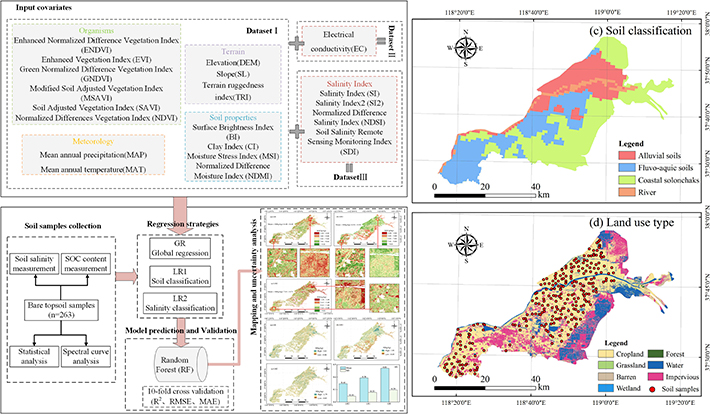Enhancing soil organic carbon prediction in coastal farmlands using multi-source remote sensing data and machine learning
发表期刊:Smart Agricultural Technology
分区:中科院二区
影响因子:6.3
Accurate estimation of soil organic carbon (SOC) using remote sensing is essential for precision agriculture and soil health monitoring. However, in saline environments, spectral signals are distorted by soil salinity, reducing model accuracy. This study aimed to improve SOC estimation in coastal saline farmlands by developing an en-hanced modeling framework. A total of 263 soil samples and 20 environmental co-variates were collected to construct SOC prediction models. Three datasets were de-veloped to explore different covariate combinations: Dataset I (conventional covari-ates), Dataset II (adding soil salinity content to Dataset I), and Dataset III (adding sa-linity-related remote sensing indices to Dataset I). Next, random forest models were developed using three regression strategies: global regression (GR), soil type-based lo-cal regression (LR1), and salinity-based local regression (LR2). Finally, model uncer-tainty was assessed, and the importance of environmental covariates was evaluated. Results demonstrated that LR2 with Dataset II achieved the best performance, with R² = 0.75, RMSE = 1.46 g/kg, and MAE = 1.06 g/kg, outperforming other strategies. Incor-porating salinity data (Dataset II and III) enhanced model performance, improving R² by 9.17 % and 4.90 %, and reducing RMSE by 7.43 % and 2.12 %, respectively, compared to Dataset I. In regions with high spatial heterogeneity, LR2 demonstrated superior performance with lower uncertainty, enabling more reliable localized predictions. Soil salinity, vegetation, and climate were identified as the most influential factors affect-ing SOC distribution in saline environments. These findings provide valuable guidance for improving SOC mapping in saline coastal regions.


